#korean particles
Text

Easiest Korean Particles
N처럼, N같이
N마다
N쯤
N이나
N처럼, N같이 = Like [Noun]
Usage: Kind of like a “simile” in English and it corresponds to “like” or “as”. When you want to express that an action appears the same or similar to the noun you attach 처럼 or 같이 to.
Note: 처럼/같이 are often used metaphorically to compare characteristics by comparing them to other things.
Examples:
그 남자는 말처럼 빨리 달려요. He runs as fast as a horse.
지민 씨는 천사같이 노래해요. Jimin sings like an angel
그녀의 머리는 아이돌처럼 예뻐 보여요.
Her hair looks as pretty as an idol.
N마다 = Every [Noun]
Usage: This is attached to nouns that express a time - time nouns. To indicate the repetition of the same/similar situation or behavior over a set period of time. It can be translated as “every”, “each”, “once every“. It’s added directly next to the time noun being described.
Examples:
주말마다 여행을 가요. I go on a trip every weekend.
금요일마다 친구를 만나고 외식을 해요. Every Friday I meet my friends and (we) go out to eat.
우리 집에는 방마다 티비가 있어요. There’s a tv in every room in (our)my house.
Note: It can also be added to non time nouns - regular nouns.
Ex: 학생마다 달라요. Each student is different.
No need to add it to words that have 매 in them as it indicates “every ___”
매일 (everyday) → 매일마다 (X)
날 (day) → 날마다 (everyday)
N쯤 = About [Noun]
Usage: It’s added to nouns that represent numbers, times, and quantities. It indicates an approximation - “about” or “around”.
Examples:
넌 열다섯 살 쯤 되어 보여요. You look about 15 years old.
한시쯤 어때요? 수업이 열두시 오십분에 끝나요.
How’s around 1 o’clock? My class ends at 12:50.
우리는 일년쯤에 중국에서 중국어를 공부할 거예요. We will study Chinese In China for around a year.
Extra Notes:
When referring to approximate prices, ‘Noun쯤 하다’ is used more often than just ‘Noun쯤이다’.
Example:
사과는 세개에 이천원쯤 해요.
Apples cost about 2000 won for 3.
N이나 = Noun Or Noun
Usage: This actually has 3 usages, but we will focus on the main one which means “or”. It can only be attached to nouns. One of the two or more listed nouns will be chosen. (거나 means the exact same, but is attached to verbs instead)
Form:
Consonant - 이나
Vowel - 나
Examples:
목이 말라요. 물이나 차를 마시고 싶어요. I’m thirsty. I want to drink water or tea.
구두나 가방을 살 거예요. I’ll buy some shoes or a bag.
토요일에나 일요일에 운동해요. I exercise on Saturday or Sunday. (You can attach 나 to 에 or leave 에 out and just use 이나)
PRACTICE SECTION:
Something to keep in mind is that when you are using these particles you do not need to also attach the subject or object particles to them!
TRANSLATE EACH
1.) We go to Itaewon every Saturday night.
2.) I went to the hospital around 10:30 am.
3.) We talked for about 4 hours.
4.) My sister can dance like Jhope.
5.) Every 2 hours I drink water or tea.
#korean particles#practice korean particles#beginner korean grammar#korean grammar#이나#나#쯤#쯤하다#마다#처럼#처럼 lesson
101 notes
·
View notes
Text
Asian Honorifics & BL - a quick & dirty guide, with examples
You ready for another one of my long broad brush linguistics in BL posts? (As always check the comments for people better than me correcting or adding content. Also I will be updating this post as long as Tumblr lets me fiddle with it.)
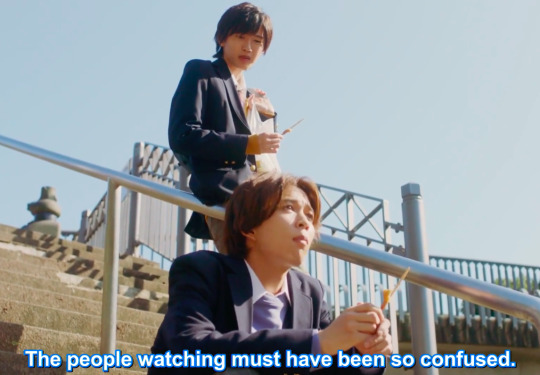
Codicil: I’m a dilettante who loves the cultural side of linguistics, and loves to help people understand BL better via language. I attempt to explain things using very simplistic terms and an anthropological approach, I am aware that it’s a lot more complicated. But I’m doing my best.
Codicil 2: This is meant to help BL watchers, not to guide tourists who in intend to travel to these countries.
Honorifics in General - the concept
Honorifics = a title or word implying or expressing status, politeness, or respect.
Many Asian languages employ honorifics in a filial manner (distinguishing status along generational lines with regards to birth year, professional relationship, and parental state). Basically calling someone who is NOT an actual blood relation “older brother” (e.g. Korean hyung or oppa) or “younger sibling” (e.g. Thai nong), or auntie (see many Indian or Latin American cultures). These can also be a kind of endearment in romantic relationships.
The closest most westerns can think of this is that the honorific is used as a way to delineate an intimate relationship/friendship across an age gap, but its implications are not always intimacy. (Except when they very much are, see oppa.)
You may be familiar with a phrases like “we’re so close she’s like my sister” or “he’s like a brother to me.”
However, because most westerners exist in relationships to peers only under the broad umbrella term friend, we will only use “like my sister” or “basically my brother” when someone is particularly dear to us but not sexually.
In most Asian languages, honorifics are more codified. So there is a status conferred by age which dictates honorifics be used. They’re mandatory for communication. Intimacy levels between individuals CAN impact this, but are not the primary decider on what honorific is used under most circumstances. Position in society is.
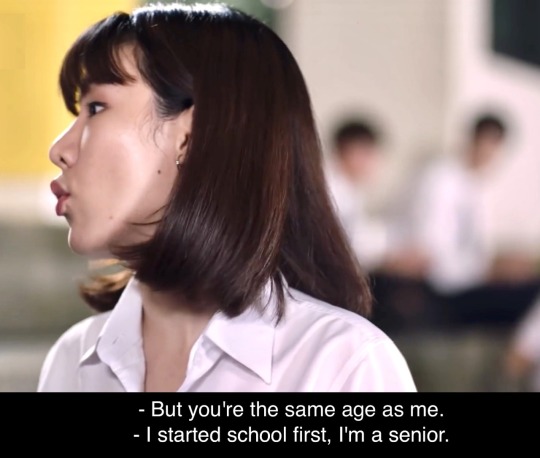
So these terms are often defined (or even translated) with sibling language. See early Thai BLs translate phi as bro, but that’s not strictly correct.
There are also often honorifics for larger age gaps (so more like auntie or uncle, delineating relationships like adult neighbors or a friend’s parents, or parents’ friends).
And there are honorifics for people in authority positions (like doctors, teachers, bosses) who are usually older (but not always). These honorifics are employed in the arenas of education, hobby activities (like ceramic classes or martial arts) and the workplace.
For many, informality of older to younger will be characterized by use of casual (or rude) language and lack of honorifics (from the older person to the younger one). So the older character will have one mode of address and way of talking, while the younger character exists in a more formal register when they are speaking back to someone older.
In other words, an older person can speak informally to a younger one, but not the reverse. (Yaja time excepted...)
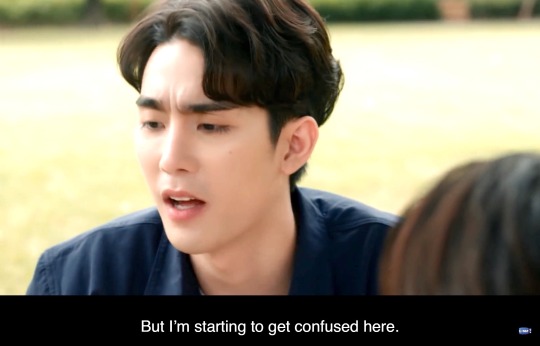
Complexity of Honorifics as Elements of Language
Honorifics can function as titles:
Honorifics can be translated as/like titles. This is is the kind of thing we are most familiar with: Mister, Mrs, Mz, Miss, Master, Mistress, Sir, Madam, Ma’am are all, technically, honorifics. So are certain forms of address and royal titles, “The honorable” for example. Anything you might put in front of a name to add formality in English probubly qualifies as an honorific.
Honorifics can function as pronouns:
Or modes of address. For example the title boss, in English can also be used to call or refer to someone directly. “Hi, boss!” or “my boss” or “the boss says.” Honorifics serve the same function. In this way they can become pronouns. You can, in Korean, just call someone “hyung” it acts as the you pronoun for direct address. And often they can also be used in the 3rd person. So my “hyung” did such and such. This is why hyung = brother in a lot of translations. Because English uses brother in much the same way, it can act as both a 2nd or 3rd person pronoun. (Rarely first, but that’s an issue with English, that our first person pronoun is so inflexible.)
In Thai you can refer to a friend as phi (you pronoun in direct address, or use it as a she/he/they pronoun in third person) or you may refer to yourself as phi (using it as an I pronoun). In other words, phi can entirely replace a person’s name in all linguistic uses.
He/She/They goes to the store = phi goes to the store (when talking about my older friend to someone else)
I go to the store = phi go to the store (when talking to a younger person about my own actions), and
you go to the store = phi go to the sore (when talking to an older friend about something they are going to do - direct address)
Honorifics are also suffixes:
In Korean and Japanese honorifics are also attached to names in the form of suffixes. See the Japanese section. (Also sometimes prefixes, argh.)
Honoring is also attached to particles:
In Thai, polite particles confer respect levels as well, which means they also contain within them certain aspects of status and honorifics. See the Thai section.
The best way to understand honorifics in BL is by example.
Ready?

Korean - Honorific titles: Hyung, Noona, Oppa & Beyond
I’m starting with Korean because it is the most spoken and understood by westerners these days. I can only address this as a layperson who watches too many Kdramas.
Korean names in brief:
In Korea names are said family name first (what we call surname or last name) and then given name second (what we would call first name). Usually the family name is single barreled or one syllable, but the given name is double barreled or two syllables. So: Chu Sang Woo = Chu (family name) Sang Woo (given name, always said together). This is why I will usually refer to BL characters by their first name as a combo, e.g. SangWoo. In formal address, however is would be Chu SangWoo-ssi. Usually the entire name is said (see comments). Even when JaeYoung is being rude he usually says “Chu SangWoo.”
Korean honorifics you’ll hear:
Hyung | hyeong 형 - is said by a younger male when addressing an older male. I will use the term Hyung Romances for BLs that feature a younger seme pursing and older uke because...
Noona | nuna 누나 - is said by a younger male when addressing an older female and is responsible for the accepted series category “Noona romances” which are dramas that feature a younger boy pursuing an older woman.
Oppa 오빠 - is said by a younger female when addressing an older male. Also used by girlfriends addressing their boyfriends, or wanna-be boyfriends. Under a romantic context oppa is considered somewhat cringe/cheesy/cutsie.
Unni | eonni 언니 - is said by a younger female when addressing an older female.
Sunbae | seonbae 선배 - is said by a younger person to an older person (gender neutral) and is more formal. It can be used in the workplace and it mostly about seniority and less familial.
Hoobae | hubae 후배 - is said to/of a younger person, either across a generational gap, or within a workspace environment, again this one is about seniority and less familial.*
Although an older person’s filial and social responsibility to a youngster is always in play.
In Kpop you’ll hear sunbae used a lot by younger (say 4th gen) groups when referring to older groups within the industry. Or when talking about Kpop idols who they don’t personally know (or are so big they’re nervous about any assumption of intimacy). On reality shows like Queendom or Kingdom it’s particularly telling. Some of the funniest moments of Kingdom Legendary Wars is any time Penal (an American from BTOB - an older v established group) tries to convince the youngsters, some of them 10 years his juniors, to use casual language (drop honorifics). The poor things get SO confused.
BL Deeper Meanings behind Hyung
Okay so the best show to watch for this one is Semantic Error.

SangWoo starts out calling JaeYoung sunbae and rarely goes less formal. Technically sunbae is polite, but also slightly insulting in a university narrative of this type. Let me try to explain. Because as they become more intimate, combative or not, friends or frenemies, SangWoo should switch to using hyung, but he pointedly does NOT.
JaeYoung, on the other hand, always uses extremely informal (to the point of rude) language with SangWoo. (Culturally, he allowed such informality as he is SangWoo’s senior both at university, and in age). But you can watch him get annoyed that SangWoo insists on sticking to sunbae, to the point where he demands SangWoo use hyung.
Then after that, anytime SangWoo does use hyung JaeYoung totally melts for it, because it was hard fought and won, and it means something powerful and significant is shifting in their intimacy as a result.

During the mutual kissing at the bar scene, Semantic Error drops yaja time on us. Yaja time is a sanctified reversal of honorifics that essentially allows for a younger person to speak their mind informally and without repercussions (or supposedly so). It’s a kind of way to flirt and tease, but also somewhat taboo and titillating as a game to play when tipsy. You get yaja time in bars/clubs sometimes, like happy hour. If you watch the final episode of Kpop reality show I-land you’ll see a real word example of yaja time in action amongst the contestants, it’s adorable and very funny.
Semantic Error uses yaja time as an opportunity for drunk SangWoo to finally talk about his real feelings, without the pressure of linguistic formality.
They also use it for JaeYoung to drop the sluttiest most flirtatious hyungs in the history of all hyunging. Seriously, the boy is dripping seduction with that one world. Why? Because HE CAN. He is making the formality itself a kind of kink.

You can watch these two on the promo circuit attempt yaja time and even though they have an easy brotherly relationship, you can still see how uncomfortable it makes Jae Chan in particular.
Other honorific play in Semantic Error:
The girl who is interested in dating SangWoo calls him oppa, and ALSO requests to use a nickname+oppa with him (the nickname means lettuce). That is pretty blatant flirting. But note she specifically asks if she is allowed to do so?
Later when JaeYoung confronts her and stakes his claim, notice the thing he really wants corrected is her language with SangWoo? He wants her to go all the way beyond sunbae to formality by using the honorific suffix 씨 (ssi). But there’s also more lettuce wordplay here (I think) because he isn’t insisting she use SangWoo’s full name.
“You should call him Chu-ssi” which is translated into English as “Mr Chu.”

A word on oppa and queerness.
Because the implication is that the person saying oppa is female, you will rarely hear boys use this term for their boyfriends (even if they are out gay, unless they are femme and/or cultivating the association for a very specific and culturally subversive of kinky reason).
Exception: non native speakers who are happy to fart around with us and the Korean social structure. So early on, NCT’s (Kpop monster group) Mark (Canadian) would refer to Yuta (Japanese) as oppa. I’m not gonna unpack their relationship, but trust me when I say, no native Korean idol would have ever done this, not right now in Korea’s current social state. Well... maybe Holland but that’s a whole other discussion.
To complicate matters Korean also uses honorific suffixes, but I’m not gonna go into them here. (Read more about Korean honorifics.)
Instead I’m gonna use Japanese to talk honorific suffixes. Ready?
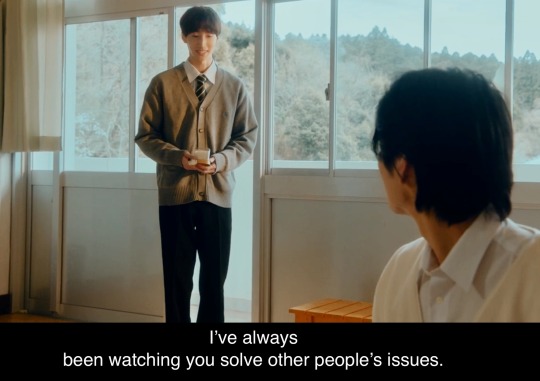
Japanese - Names & Honorifics: suffixes & titles
Like Korean, Japanese uses both suffixes and title honorifics. But I find the suffixes much easier to hear in Japanese than Korean, probubly because I’ve more experience with the language.
Note: As a foreigner in Japan I’ve alway found it best/easiest to refer to someone using surname-san.
Japanese names in brief:
Names are said family name first and then given name. But actually, given names are rarely, if ever, said AT ALL (after an initial introduction).
In BL dramas almost all character’s names and everyday use name will be the family name. (Children are different, but not many of those in JBL.) Teachers may refer to their students by given name-kun.
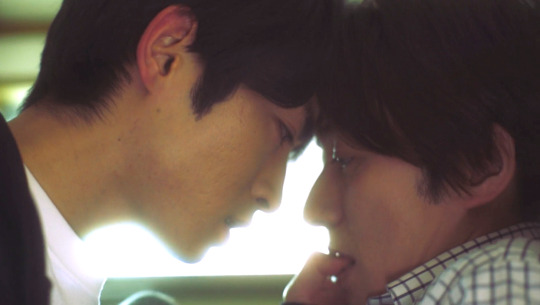
So in Old Fashion Cupcake Togawa is his family name (not given name). Nozue (also a surname) who is both older and Togawa’s boss, refers to Togawa simply as Togawa, with no honorifics, probubly because they are both adult characters and have been coworkers for so long, Togawa-kun would be... odd.
Togawa on the other hand, ALWAYS refers to Nozue as Nozue-san. Even in times of EXTREME intimacy the honorific -san is ALWAYS used.
We have no idea what the given names are for these characters because we never got to that point of intimacy in their relationship. In Japanese romances the given name is usually the ultimate intimacy and is not exchanged until well into a relationship, sometimes after sex or even after marriage. You can watch the delicate maneuvering around this aspect of intimacy in the kinky het drama Sweat & Soap (it’s not BL, but I still love it, on Viki.)
Japanese Suffixes you hear the most in BL:
-chan = is intimate and cute for children, or amongst female friends, or female family/intimates (like your grandma)
-kun = is for respected juniors, younger or junior co-workers, or young boys, and amongst friends
-san = is formal/polite and for general use, amongst friends, equals, strangers, and acquaintances
The best BL to watch to hear all three of these in constant use is Minato’s Laundromat.

Shin always calls Minato, Minato-san and gets very annoyed when anyone doesn’t do this who should (he want’s his man properly respected). Note that he puts Minato-san into his phone as Akira, tho... daring boy.
Asuka calls Minato: Akira-san, which he shouldn’t as a kid a generation younger than Minato. He gets away with it because he and Minato are from the same neighborhood and have similar open, friendly natures.
Minato, on the other hand, struggles with what to call Shin. Technically he should use Katsuki-kun or even Katsuki-chan (which is what he uses on Shin’s sister). Which is Shin’s surname + the suffix for a junior. But Minato is a causal person, so he never bothered with a suffix even at first. Now, informal language is fine from an older person to a younger one, if they have the right personality. But under BL circumstances, Minato’s lack of honorifics kind of gave Shin license to flirt. The moment Minato asked if he could use the nickname Shin he was a goner.
As Shin becomes more aggressive in his pursuit, Minato hops desperately between different suffixes to try to control the situation:
Shin (informal and friendly),
Shin-chan (diminutive, under this context = somewhat demeaning, considering what Shin wants from him), Minato is intentionally lowering Shin’s status and emphasizing his youth when he applies -chan,
Shin-kun (when he thinks Shin is mad at him, or in public, or when he is annoyed and wants to add formality and distance)
I talk quite a bit about this in my squee watch of this series.
Putting someone who should be (or is usually) address by one combo of name (first or last) + suffix into another, by changing either the name of the suffix or both, always has narrative significance for character development or plot or both in Japanese romances. Which is why you get more from the story if you train your ear to listen for these.

In the picture above, Takara is using -san for sarcasm and to gently chide Amagi. Usually he just uses Amagi with no honorific (they are the same age, and he is a curt characters) or Amagi-kun in public of for call/response address. He has moved to a higher level of formality for emphasis and to make a point in this scene. Communicating properly and avoiding conflict is a hallmark of his character, also (as the seme) he wants to control Amagi. This is all wrapped up in that personality and attitude. He is being teasing and sarcastic, but he is also stressing that this dialogue is important to him.
Read more on Japanese honorific suffixes here.
Japanese honorific titles you hear the most in BL:
Senpai (先輩、せんぱい) - senior colleague or classmate, roughly equivalent to the Korean sunbae or Thai phi
Sensei (先生、せんせい) - refers to teachers as well as people who are experts in their respective fields, like doctors, artists, professors, martial arts instructors, or lawyers
The best BL to watch for use of honorific titles in Japanese is... bet you thought I wasn’t gonna manage to shoehorn it in.... Seven Days!
*insert wild cheering*
Sereyo (younger) seems to relish and very much enjoy and flirt by using the honorific senpai with Yuzuru. It’s hard to explain, but the way Sereyo says "senpai” whenever they meet is very very... cute.
You can hear these characters use sensei when in archery practice. And you can hear use of some family suffixes and honorifics since we follow both characters back to their respective homes.

Sereyo calls Yuzuru, Yuzuru-san, which is Yuzuru’s GIVEN NAME + the honorific. This is unexpected because Yuzuru is his senior. He should call him by his surname + honorific: Shino-san.
But Sereyo has an issue, which is that Yuzuru has the same last name as his ex-girlfriend, who was also older. So in his previous relationship, Sereyo called his lover: Shino-san, and he doesn’t want to use the same exact name with his new lover, Yuzuru. So despite Yuzuru being his senior, he asks to use Yuzuru’s first name as a mode of address. Yuzuru being the kind of casual blunt personality he is, doesn’t mind the inherent informality and permits this right away.
More on Japanese honorifics here.
Mandarin Chinese Honorifics

Ho boy am I not going to climb into this one. But I will point out that to confuse matters many Chinese honorifics are actually also blood relation titles - 哥 ge (older brother) 弟 di (younger brother) - (like phi/nong, par/ar, hia/jay in Thai). In other words, the honorific actually is both brother (honorable title) and brother (actual word) AND will be applied to cousins. As in: the word for cousin is ALSO the same word as brother.
In Thai to clear up this relationship a character will often have to state it blatantly: "my real actual older bother, by blood, and not an older male friend” (since phi means both) and not a lover. See this grappled with as a jealously plot point in Star in My Mind.
But in some Chinese BLs they will also have to explain and distinguish actual blood relationships as different between cousins and siblings. You can watch Addicted deal with these nuances.
It should be noted for the BL crowd that Mainland Mandarin and Taiwanese Mandarin are ALSO different. So there are language nuances to Taiwanese BL that do not exist in Mainland BL (when it was around) and vice versa. And because Taiwan recognizes equal rights, there is also a whole adapted Chinese linguistic set around queerness.
I’m mentioning Chinese in this post mainly because it will come into play with Thai honorifics: hia & jie/jay 姐. Personally I struggle to even distinguish names let alone honorifics, I find Mandarin a particularly difficult language.
Thai - Honorifics, Pronouns, Particles & beyond phi/nong

I have quite a bit on Thai honorifics and their complexity plus how it relates to BL.
Thai Honorifics Between Ages in BL and real life
More on Thai Linguistic Registers - Particles & Honorifics
Thai Pronouns & Honorifics when Seme/Uke is Flipped
Sarcastic use of honorifics & polite particles in Thai
Linguistic Fun In Thai BL - couples
The Nu Diminutive in Thai
Touch & Daisy in Secret Crush On You - Queer Coded Language and 3rd Gender Identity
The most important thing to know, and how it’s different from Korean, is that phi & nong are gender neutral.
Also honorifics and politeness in Thai plays into both pronoun use and polite particles. Thailand does not have honorific suffixes like Japan or Korea, instead particles (which are kind of like spoken punctuation) come into play.
It’s complicated, in that there are a lots of ways to indicate relationships in Thai. But less complicated in that, at heart, gender doesn’t impact it as much as in Korean or Vietnamese. Instead, like Japanese’s -san, you can default to formal register by remembering to use khun (+ polite particles).

Loosely?
Phi = hyung, noona, unni, oppa, sunbae, or senpai, and its gender neutral.
Nong = hoobae or -kun or -chan, but is rarely used in direct address. Instead, informality in Thai is characterized by use of casual (or rude) language and lack of honorifics (from the older person to the younger one) + rude or informal particles. Nong is also gender neutral and can be used as you pronoun (rarely as I), or as a third person pronoun to refer to pets, or as a diminutive attached to a name, it’s... complicated.
Actually episode 10 of Love Mechanics plays with this. Vee whispers in Mark’s ear the equivalent to “Phi’Vee loves cute nong Masa.” Masa is Mark’s given name and it is Japanese because Mark is half Japanese.
But then, to tease him, Vee lowers his voice (Japanese men speak from low in the chest) and says: Masa-kun. Kind of the Japanese rephrase of the above.
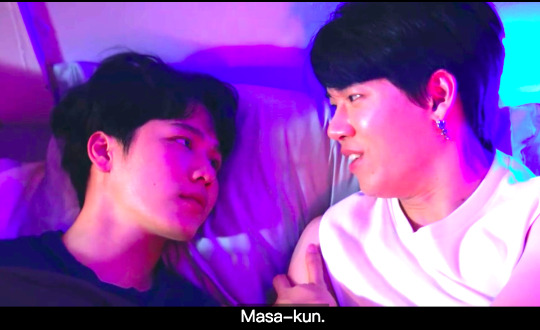
Hia = hyung/oppa (it may be used by a younger male or female but is only use on an older male) and specifically ties to Chinese heritage.
Jie/jay = noona/unni (it may be used by a younger male or female but is only use on an older female) and specifically ties Chinese heritage. It has also been coopted by the queer community and may be translated as “sis” under those circumstances. More about hia here.
Khun = -ssi or -san, and is a gender neutral formal address. It can be a title Khun + Name (first or last), an I/you pronoun, and also a proper name (ya, know, just for s&gs). Also in families that are more formal it is a mode of polite address for parents, Khun Maa for mother, Khun Paa for father.
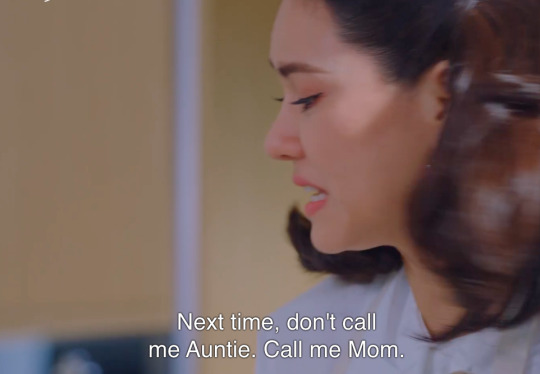
Vietnamese Honorifics
Vietnamese honorifics and modes of address are not my bailiwick but the amazing @squeakygeeky has been blogging a series around VBL linguistics and it’s queer struggles with pronouns because of bifurcation around gender.
Oh boy was this a lot. And I am sorry to @timelesstoothfairy who originally asked this question, I don’t think they realized what a can of worms it opened up.
Language, how is it SO MUCH FUN?
(source)
#BL language#bl linguistics#thai language#thai linguistics#asian honorifics#linguistic registers#honorifics#korean language#korean honorifics#japanese language#japanese honorifics#thai bl#japanese bl#korean bl#thai pronouns#thai particles#polite particles#Thai Honorifics#Thai Linguistic Registers#Linguistic Fun#chinese bl#addicted bl#addicted heroin#addicted the series#Star in My Mind#Japanese suffixes#seven days the series#Japanese honorific titles#Japanese honorific suffixes#ShinMinato
476 notes
·
View notes
Text
me after studying Korean for half an hour: why did I choose this language I wanna kms
1 note
·
View note
Text
10.09.23 - 9/100 dop
(posting a day late)
packed & travelled back
greek on duo (will i ever learn all the verb endings? i’ve already been through this with spanish and italian. and german. please why. thanks korean for just having tenses to worry about)
more family time, i am not extroverted enough for this chief
honestly nearly excluded this day as well but i’m pretty sure the challenge was intended to define “productivity” as NOT just academic / work / skill improvement stuff and i did feel good about the day. so there
🎵 Shinunoga E-Wa- Fujii Kaze
#mine#text#studyblr#100dop#learning greek#verb conjugations my beloathed#i don’t actually hate them <3#only when i don’t know them#when you’ve witnessed german cases you’re unphasable tbh#and korean particles i’m sorry to say why are there so many </3
0 notes
Text
just listened to arlecchino in jp im.........
#korean va is good tooo..#cn IS GOOD TOOOO#im a dyke#she sounds like a guy....#mmggnf#♡ genshin ♡#arlecchino genshin impact pls hmu#SHE USES MASCULINE PARTICLES I WONNN
0 notes
Photo

SELF COMPOSED SONG - PARTICLES | :02-1:01
“this comedown won’t cure itself; it’s driving you away, piece by piece, day by day.”
TW: DRUG USE/ADDICTION
auditioning for next gen doesn’t even cross joomi’s mind. sure, he sees the advertisements; it’s hard to avoid them. they’re plastered just about everywhere outside and everywhere online and joomi figures they must be pretty desperate for participants.
he knows some of his friends will participate. he already has friends that are trainees, so of course others would want to join them, right? he doesn’t know how he, just some guy that plays piano in a punk band, befriended so many idol hopefuls, but he did, and of course, one of said idol hopefuls would convince him to join him in auditioning.
joomi just has a hard time saying no to stevie, and he has no shot in hell of making it on the show, so okay, sure, he’ll submit an audition tape in support of his friend. if it gives him more courage to audition himself, then sure. joomi can do it. why the fuck not.
he probably shouldn’t take it that seriously. it’s not like he wants to succeed, so he could just submit some bullshit tape where he doesn’t even try and accomplish their goal.
he doesn’t know why that’s so hard. at first, he decides he’ll just sing any random song. that’s all he’ll do. sing. he’s a mediocre singer at best, so that’ll work fine.
it bothers him, though. he’s never really sung for anyone else before; does he really want the first time he does to be something half-assed? not really.
so then he starts looking into songs more seriously, and of course, all of the songs he likes best would be better accompanied by him playing piano...so okay, sure, he can do that too. no big deal. it’ll make singing come more easily too, surely, and for better or worse, he’ll look more competent.
he doesn’t know if he really wants to look more competent, but does he really want to humiliate himself in front of whoever will be judging these tapes? god, what if they select him for the show as some talentless comic relief or source of pity, just to have someone terrible on, and they show his shitty audition on national tv?
that’s a terrifying thought.
is making it on the show because someone thought he was good enough, and them broadcasting a decent audition any less terrifying?
not really, but whatever, right? if he does, by some miracle or terrible, terrible curse, get on the show, he can’t dance for shit, so surely that’ll do him in. okay. sure. he won’t throw the audition. whatever.
so if he’s taking it seriously, what does he do?
he can make a piano arrangement for just about anything, and if he wants to show off, that’s probably the play. he isn’t sure that he wants to show off, but it would be more fun than just singing and playing someone else’s song entirely. he’s pretty sure his instrumental skills are the only thing he has going for him. luckily, the website says they won’t judge by that, so joomi can give the arrangement everything he’s got and it won’t even matter because his voice is so average.
great. he still can’t decide.
he leafs through song options on his phone, then gets a call. he dismisses it quickly, but accidentally goes to the log of his calls, and sees the outgoing call to his mom on seollal there. he frowns.
it’s not like he would’ve stopped thinking about that call even if he didn’t see evidence of it. it haunts him even now, and he’s still worried sick about his mother. he can’t shake the feeling, no matter how hard he tries, and even though his therapist tells him his mother’s wellbeing is not his responsibility if it’s taking such a toll on his wellbeing; especially if she insists on staying around his abusive father. it’s not a healthy situation for him, she said. he deserves to live the life he wants, she said.
he doesn’t know what life he wants, but he’s trying to find it.
he thinks, momentarily, about him becoming a kpop idol. could he ever want that life?
it’s a hilarious picture, honestly. there’s no way in hell.
if he could have any life he wanted, he would still write songs. maybe he could make it a fulltime job, or maybe he could just write songs for a different stupid band, without an asshole of a lead singer, or maybe he could be the lead singer. maybe he wouldn’t be afraid to put his name on the songs anymore. maybe he could embrace that vulnerability instead of being embarrassed by it, and maybe he could accept the compliments on their lyrics for himself. maybe people would tell him his lyrics inspired them, or helped them through a difficult time, and he could say me too. writing this helped me too.
what if he starts now? this audition tape probably won’t make it anywhere past the judges’ hands or computers or whatever. what harm is there in them knowing he can write his own songs? besides, he can’t decide what other song to perform, anyway.
once he opens his mind to performing his own song, he decides which one he wants to sing easily.
it’ll be difficult, both in a literal and more emotional sense. the vocal part is a little hard, but more than that, the lyrics weigh too heavily on his heart.
maybe if he performs it, he’ll be able to breathe a little easier.
–– ♬ ––
joomi has some connections by being such a music nerd. namely, the owner of the music store down the street from his apartment knows him well enough that when joomi gathers the courage to ask if he could use one of their pianos for an audition tape, he says yes. joomi would do it at home, but he doesn’t want his roommate’s noise to interrupt the audition, or for him to hear him singing at all, really.
joomi gets to stick around a little after hours, once the store is clear of all the customers, employees the only ones left to rearrange the stock after a long day.
he sits down at the piano that’s his favorite here. he wants to buy it, but it’s too expensive, and he has no place for it in his apartment. even if he did, he wouldn’t trust his idiot roommate not to destroy it, so he just comes by here to play it from time to time.
he tests a few angles with his phone, setting it down in multiple places near the piano, but none feel quite right.
“do you want me to film you?” the owner of the music store asks, without joomi even realizing he approached. joomi hesitates. that would probably work better, but does he really want someone else to film him and see him perform like this?
why the fuck not, right?
“yeah, sure. thanks,” he says, and he hands his phone over.
he settles himself in front of the piano, and when he rests his hands on the keys, it feels familiar and comforting. he looks up at his friend holding his phone, and nods. the man nods back at him, an indication that joomi can only assume means he’s filming. he sings first, without the backing of the piano:
it's been like a year since i've been home
he plays a few keys, then sings the next line:
flirting with an addiction i can't shake off
joomi has never suffered with an addiction, but his mom has.
this is a song he wrote for her but will never share with her. he wrote it shortly after seollal, and the call he made to cut her off, at least until she got more help. it’s a song he wrote from her point of view, with a little wishful thinking; some sort of attempt at manifesting her getting better.
he misses her now more than ever. he hopes, eventually, she’ll call him again after she’s gotten help and recovered some, just like he asked her to. he can buy her lunch or dinner and she’ll never be the mother he needed, but she can be...something; maybe more of a friend.
my mouth is dry, i self-medicate
this comedown won't cure itself
previously, each line was punctuated by the piano, but now, the piano continues consistently as he sings:
it's driving you away
it's driving you away
piece by piece
day by day
this part is about him, too. he is the one his mother’s self-medication drove away, and he doesn’t know if he will ever return. it breaks his heart. next comes the chorus, with more power, both in the piano chords and the vocals.
baby, tell me if i'm being strange
and if i need to rearrange
my particles
i will for you
is it possible? would his mother rearrange her particles for him? he likes to think so. she never did when he was a child, but maybe one day...he’ll be enough. he’ll be worth changing for; getting better for. he hopes so.
my particles
i will for you
his minute is over before he knows it, and he doesn’t feel nervous. he looks up at the camera, and nods, and his friend stops the video.
“i didn’t know you could sing like that,” he remarks.
“um...yeah,” joomi replies. he doesn’t know why he sounds so impressed.
when he gets back to his apartment, he’s too afraid to watch his tape. he doesn’t want to hear himself sing, so he doesn’t. he uploads the video and his application to the next gen website without double checking anything.
#be:ngs1p1#–– solo#–– particles#song is in korean ic linked song is just reference use your imagination etc etc#guess it's happening!#the contrast between him and nayoung is so funny#tw: drug use#tw: drug addiction#–– nextgen
1 note
·
View note
Text
을/를
you may not use it if you want to but * the longer the sentence, the more necessary to use it.
어제 누구를 여기에서 만났어요?
who did you meet here yesterday?
0 notes
Text
N1{*v}랑 N2 • N1{*c}이랑 N2
[...·rang ...] • [...·i·rang ...]
(spoken Korean) (informal) (can be repeated more than twice) N1 and N2
If N1 ends with a vowel ➡ N1랑 N2
Else ➡ N1이랑 N2
#랑#rang#이랑#irang#grammar: linking words#grammar: conjunctions#grammar: adverbs#grammar: all#spoken Korean#grammar: particles#and
0 notes
Text
One-Page Masterlist
안녕하세요! Hey everyone! I recently got an ask about my old masterlist, which is the same as my broken-down masterlist except it has all of my lessons on one page, rather than on multiple separate posts. Some may find this expanded version easier to navigate, so I’ll keep this up for y’all! My broken-up masterlist, of course, will still be available for those who find that more helpful :)
Hangul Lessons
Consonants
Vowels
Writing/Reading Korean Syllables
Some 받침 Rules
Diphthongs
Stroke Order
Some More 받침 Rules
Irregular Verbs
The Basics
Common Phrases
Numbers
Sino-Korean vs. Native Korean Numbers (Instagram Post)
Sentence Structure and Particles
Present-Tense Conjugations and Formal Language
Adjectives
Questions
Honorifics and Casual Language
Beginner
Negative Sentences
잘 and 못
Past Tense
Future Tense (-ㄹ / 을 것이다)
-ㄹ / 을 까요? (Shall we…? / I wonder…?)
-(으)세요 (Giving Commands / Asking Questions)
Telling Time
-고 싶다 (I want to…)
How to Say “And”
-지만 (However)
아/어/여서 (So…)
Negative Commands
Spacing (띄어쓰기)
Adverbs
ㅂ Irregular
Comparatives and Superlatives
난, 날, & 내가
Upper-Beginner
-(으)면 (If…)
아/어/여도 (Even though…/Even if…)
(으)면 되다 / 아/어/여도 되다 (I can…/You may…)
-아/어도 되다: Asking for and Giving Permission (Instagram post)
-(으)면 되다 & -(으)면 안 되다 (Instagram post)
아/어/여야 되다 and 아/어/여야 하다(Have to / Should)
Present Progressive (-고 있다)
How to Say “Or”
-아/어/여하다
All About 중
How to Use -(으)로
Before & After
-ㄴ/은 채로
Intermediate
Describing Nouns with Verbs (-는 것)
Describing Nouns with Verbs - Past & Future Tense (-ㄴ/은 / -ㄹ/을 것)
Nominalization
것 같다 (I think… / It seems…)
-러 가다 / -러 오다
-(으)려고 (In order to…)
-기로 하다 (to Decide to do Smth)
척하다 (To Pretend)
-게 되다
-군요 / -구나
아/어/여 보다 (to try…)
-은/ㄴ 적 있다 / 없다 (I have / have not)
-ㄹ/을 게요 (Future Tense)
겠다
-ㄹ/을 수 있다/없다 (I can / cannot)
-ㄹ/을 때 (When…)
-ㄴ/는다면 (If)
-(으)면서 and -(으)며
-(으)니까 (Because / So)
-아/어/여주다
-(ㄴ/는)다 (Narrative Form)
Quoting
Let’s…
Quoting continued
(으)ㄹ래요? (Wanna…?)
-죠
-대로
More Quoting - 대 & 래
잘하다 & 못하다 vs. 잘 하다 & 못 하다
-아/어 가지고
-(으)려면
-는 길에 & -는 길이다
-(으)면 vs. -ㄴ/는다면 (Instagram Post)
-았/었을 것이다
-느라고
-는 데(에)
-ㄹ/을 뻔하다
Upper-Intermediate
-ㄴ/는데
-(으)ㄴ/는지 (Whether or not)
-(이)라는…
All About 아무리
-잖아요
Expressing Surprise
-시 (Honorific)
Making Comparisons
-아/어/여지다
I might…
So that…/To the point where…
Causative Verbs
시키다
Passive Verbs (part 1)
Passive Verbs (part 2)
-ㄴ/은가 보다 & -나 보다 (I guess…)
-ㄹ/을수록
Other Meanings of 싶다
-자마자 & -는 대로(As soon as…)
-긴 하다
-치고
-김에
차라리 (Rather)
-(으)ㅁ Nominalization
-기는 무슨 & -기는 개뿔
-고 보니까
-듯(이)
버리다
-(으)면 좋겠다 & -(으)면 하다
-길 바라다
Advanced
-거든(요)
-줄 알다/모르다
-ㄹ/을 테니까 and -ㄹ/을 텐데
-았/었던
아니라 and 대신에
-ㄹ/을 리가 없다
편이다, 별로, and More
-지 그렇다 (Why don’t you…?)
-ㄹ/을 걸
-ㄹ/을 까 보다
-다면서요
-다니 part 1
-다니 part 2
뜻이다 & 말이다
-다가
-더라고(요)
-더니
Some colloquialisms: 아니시에이팅 and 뭐 이렇게
-(으)ㅁ Sentence Ending
-다 보니까
What does 따위 mean?
-ㄴ/는데도
Korean Idioms
Vocabulary
Must-Know People
Must-Know Places
Must-Know Things
Must-Know Verbs
Must-Know Adjectives
Countries
Months, Days of the Week, and More
Clothing (옷)
School (학교)
Autumn (가을)
Autumn (w/Pictures!)
More Questions
House / Apartment (집 / 아파트)
Emotions / Feelings ( 감정)
Animals (동물)
Loan / Konglish Words
Food and Drink (먹을 것과 마실 것)
Parts of the Body (몸)
Counters
Modes of Transportation (교통 수단)
Colors (색깔)
Colors (with Pictures!)
Weather (날씨)
Winter (겨울)
Music & Instruments (음악과 악기)
Baking Gingerbread Cookies
Emergency (비상)
Hygiene & Bathroom (위생 & 화장실)
Indefinite Pronouns
Work / Office (일 / 사무실)
Spring (봄)
Coronavirus Prevention (코로나바이러스 방역)
How to Wash Your Hands (손을 씻기)
Time (시간)
Korean Cuisine (한식)
Summer (여름)
Summer (여름) w/Pictures!
Graduation (졸업)
Identity (독자성)
Korean Text Slang
Similar Words
Makeup w/Pictures! (화장품)
Family (with Pictures!)
Pronouns
How to Say “Still” and “Already” in Korean
Tastes & Textures (맛과 질감)
K-Pop Audition
K-Pop Fandom Terminology
Different Ways to Say “Change”
Flower Names
What Does 원래 Mean?
What does 오히려 Mean?
College
Hanja Lessons
최
수
악
식
급
동
부 & 불
애
출
퇴
예
음
중
학
습
연
생
대
입
인
문
감
과
원
특
만
후
무
Charts
Present, Past, and Future Tense
Question Words
잘 vs. 못 and Negative Conjugations
Future Tenses
-았/었던 vs. -던 (at end of lesson)
Particles
Some 받침 Rules
Gifving Commands
Conjunctions and -아/어/여서 vs. -(으)니까
-(으)면 vs. -다/라면 and Different Ways to Say “And��
How to Say “Or” (at end of lesson)
Telling Time (at end of lesson)
Comparatives and Superlatives
잘하다 & 못하다 vs. 잘 하다 & 못 하다 (at end of lesson)
Comparing 잘하다/못하다, 잘 하다/못 하다, & 수 있다/수 없다
Irregular Verbs
Pop Quizzes
Level 1
K-Pop Breakdowns
TXT - “Cat & Dog”
Twice - “Feel Special”
Enhypen - “Fever”
2NE1 - “Go Away”
Lee Hi - “Only”
“기억을 걷는 시간 (Time Spent Walking Through Memories)”
KCM - “An Old Love Story (흑백사진)”
Taeyeon - “Can’t Control Myself”
Epik High - “Lost One”
Colde - “A Song Nobody Knows”
IU - “My Sea”
Enhypen - “Polaroid Love”
유라 (youra) - “하양 (RAL 9002)″
BTS - “Ddaeng”
Stray Kids - “For You”
Woozie - “어떤 미래 (What Kind of Future)
TXT - “Eternally”
LOONA - “Heart Attack”
Stray Kids - “Muddy Water”
LOONA - “Girl Front”
Pentagon - “Daisy”
BTS - “Sea”
Semester in SK
Nami Island (남이섬)
Things to Buy at Daiso
Shopping Phrases
Ordering Coffee
Signs in Korea
Ordering at a Restaurant
Riding the Seoul Subway
Things at the 편의점
Korean Curse Words
Etiquette in South Korea
Drinking Culture
Hanja in Real Life
Holidays in South Korea
Korean Cuisine
Concert Ticketing in South Korea
K-pop Comebacks in Korea
Summer in South Korea
What I Learned
#korean#korean language#hangul#korean grammar#korean vocab#korean vocabulary#learn korean#learning korean#langblr#Korean langblr#masterlist#apok#apopofkorean#study korean#studying korean#kpop#kpop lyrics#basic korean#beginner korean#intermediate korean#advanced korean#hanja#한국어#한글#한자#한국어 공부하기#한국어 배우기#한국어 문법#한국어 어휘#초급 한국어
2K notes
·
View notes
Text





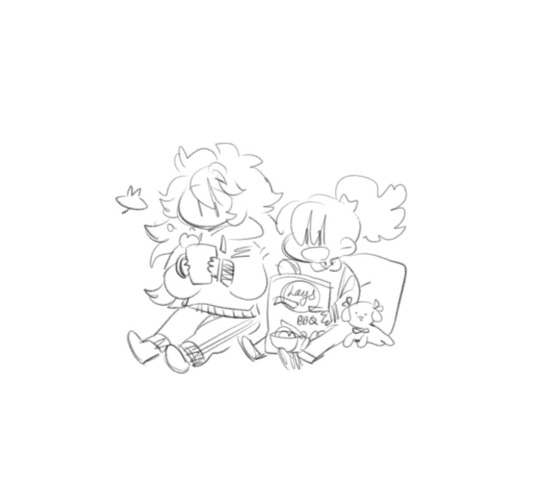
this is charlerusse (charlotte russe)
she's from an rp community set in the distant future where humanity fled to the moon and also a subset of them are superhumans/extrahumans? it's a pretty popular genre in rp comms and i think korean webnovels/etc. in general (이능력자)
her superpower is that she can make motes of light that she can interact with physically, so kind of like building hard light constructs from dust particles
327 notes
·
View notes
Text

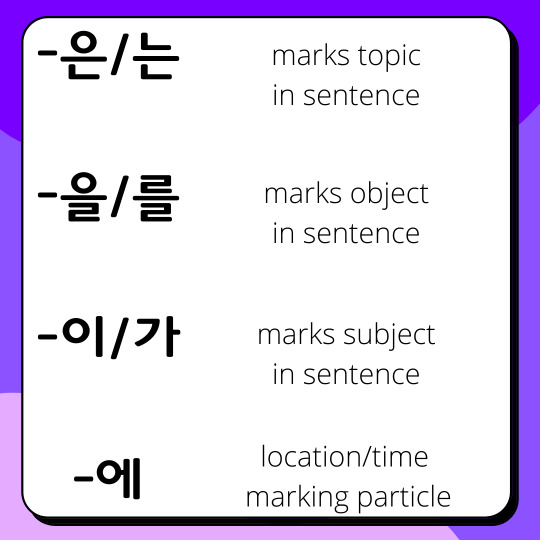
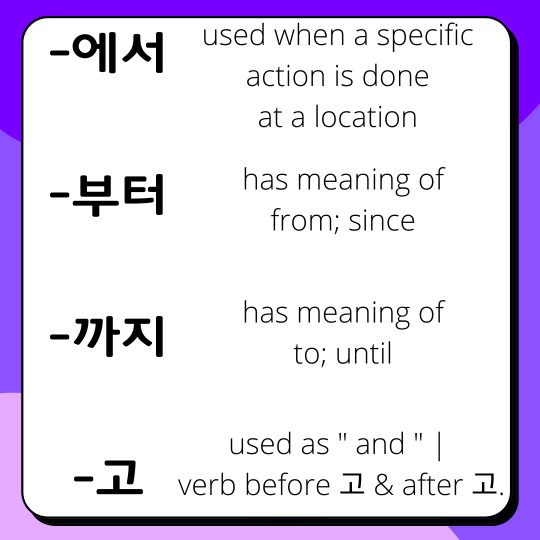
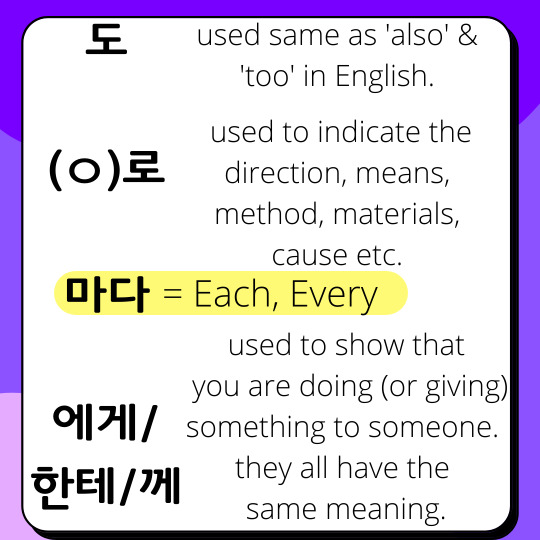
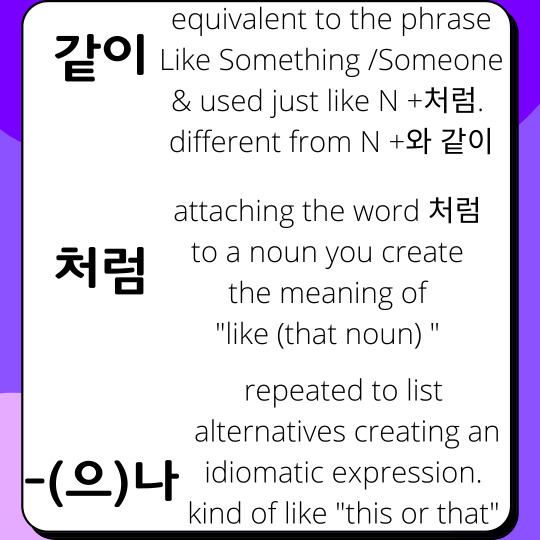
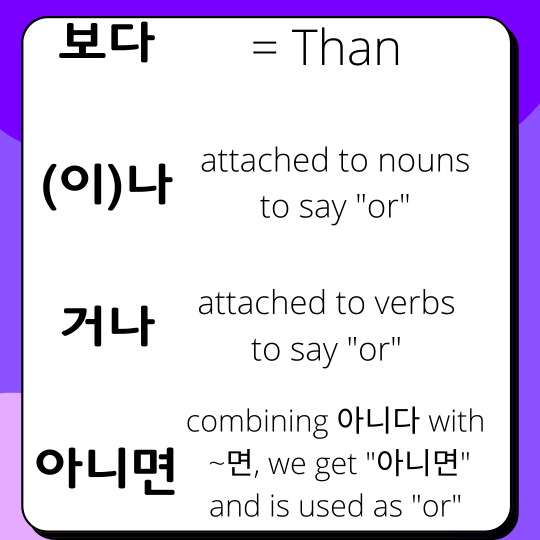
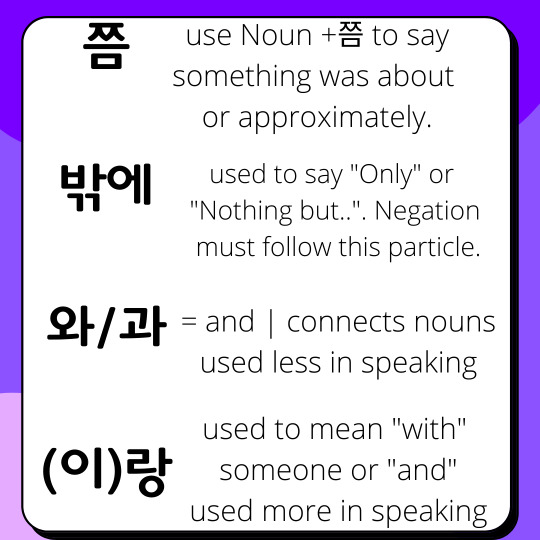
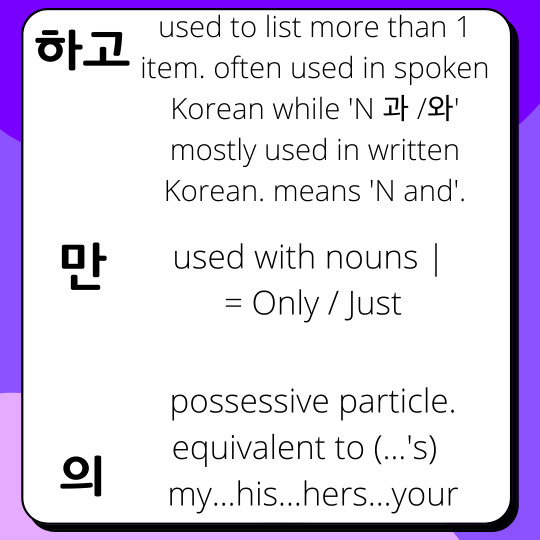
All Korean Particles
I don’t know if this list contains every single particle, but I tried to add all. I didn’t add korean counters, they may be counted as particles as well. Not every particle has it's own example sentence by the way.
Here Are Some Example Sentences:
🌃- 은/는 & -에 & -고
동생은 부산에 살고 나는 서울에 살고 있다.
My sibling lives in business and I live in Seoul.
🍞- 을/를 & -에
아침에는 빵을 먹어요.
I eat bread for breakfast
🪢- 이/가
네가 밀면 내가 끌게.
You push and I’ll pull.
🗺- 에서 & 에
우리는 주말에 공원에서 만났어요
We met at the park on the weeknd.
🏁- 부터
지난달부터 그녀를 보지 못했어요.
I haven't seen her since last month.
🌙-까지 & -부터
그녀는 아침부터 저녁까지 일해요.
She works from morning to (until) evening.
🫵- 도
저도요 (Me too)
🍦- (ㅇ)로 & -을/를
아이스크림을 숟가락으로 먹었다.
I ate Icecream with a spoon
🗓- 마다
주말마다 (Every weekend)
👧🏻- 에게 | 한테 | 께
지수는 아이가 너무 귀여워 아이한테 뽀뽀를 했어
Ji-Soo kissed the child because she was so cute.
👨✈️- 같이
사장님은 직원들에게 친구같이 편안하게 말해요.
The boss talks to the employees comfortably like a friend.
🧑🍼- 처럼
아기처럼 울다 (to cry like a baby)
😡- (으)나
좋으나 싫으나 너는 한국 사람이 아니야.
Like it or not, you are not Korean.
🛤- 보다
기차보다 비행기가 빠르다
A plane is faster than a train
✏️- (이)나
공책이나 연필
notebooks and[or] pencils
- 거나
민준은 주말에 보통 친구를 만나거나 영화를 본다.
Minjun usually meets a friend or watches a movie on weekends.
⌚️- 쯤
두 시쯤 만나자
I will see you around two.
👆- 밖에
하나밖에 없어요.
There's only one/nothing, but one.
👥- 와/과
너와 나 (You and I)
🗣- (이)랑
친구랑 이야기하다
talk with a friend
🧅- 하고
나가서 양파하고 두부 좀 사와.
Go out and get some onions and tofu.
⏱- 만
한번만 (Once)
👜- 의
저의 가방 (My bag)
#practice korean particles#korean particles#all korean particles#list of all korean particles#한국어#korean lesson#한국어 공부#한국어 단어
150 notes
·
View notes
Note
HELLO! I just penned a little missive on Cherry Magic, and I wanted to ask you the following question. Please forgive me if this has been asked before or if you've written on it!
I wrote in my Cherry Magic post the following: "There’s something I’m pondering about the BL trope of an individual having a queer revelation only after being approached with the opportunity. I want to pose this question to expert viewers of the genre, but what I’m wondering is whether or not the nations from which these shows hail, view this revelatory experience as one being on a/the sexuality spectrum, or if it’s expected to be a one-time episode of queerness that wouldn’t necessarily repeat itself in an individual’s life."
Do you have any thoughts on this? I really have no idea what, say, the general Japanese or Korean public think about spectrum expressions or identifications. I think I've read about this phenomenon in the past as being "queer only for you," but in the wider scope of BL and LGBT art, I do wonder if there's a beautiful conversation lurking out there about existing on the sexuality spectrum and whether or not there are shows out there that explore this. I guess KinnPorsche touched on it with Porsche as a bisexual lead?
(I also noted later in the Cherry Magic post that in the later volumes of the Old Fashion Cupcake manga, that Togawa "outs" Nozue as "not gay," which I think is a curious identification that relates to my question above.)
THANKS, if you have the time to offer your thoughts!
Collectivism & Identity Politics
I would posset that what your picking up on may be a fundamental difference between ask and guess cultures. Not to mention collectivism versus individualism.
When you exist in a sphere where your identity is far more enmeshed with your social interactions, who you are as a person is, fundamentally, defined in part by who you are with and how you fit into the social fabric of your surroundings. Just think about how Thai pronouns change depending on who you are with, including the “I” pronoun.

Think about the whole honorific system and how names (titles) change according to social status and power dynamics. I mean just think about that for a second, your OWN name, your very selfness, changes depending on who you are with.
In Thailand it isn’t, “When a tree falls, does it make a sound?” it’s
“What word for “I” do I use, when I am alone?
Under those circumstances, would not attraction be more a factor of feedback and encounters rather than self reflection and epiphany?
It is not, in the end, a lack of self awareness, but the fact that the "self" is defined differently in different culture. Identity is defined differently. If the self is partly (or wholly) made up of social connections as well as the individual’s personal feelings, than all notions of self (including sexual identity) are informed by connections with others.

That got very cerebral but I hope it makes sense.
Why Linguistics is Important to Understanding BL
As to ownership of gayness, or queer spectrum identifiers/monikers, I talk about that (as an introduced concept) with regards to Thailand and the complexities around the word “gay” in this post. It applies somewhat to Japan as well, who also will use the English word. Korea uses the English word for a romantic “kiss.” Imagine what that says about the culture and its perception of kissing!

A collectivist approach to identity by its nature may be both more fixed (if the group is focused on denial) or less so (if the group has the attitude of “who you’re with is who you are”) because the group is doing the primary defining of identity.
So Togawa may identify as gay where Nozue does not (or considers himself bi/pan) or doesn't think ownership of an identity actually matters because ultimately the group will decide based on who he is partnered with. Because unlike in most Western parts of the world, the perception of others actually does genuinely inform your own identity.

Putting aside gay for you, a collectivist culture which is accepting of ranging sexualities is going to define you by who you are with and not really think or care about what label you wish to apply to yourself, because that is less relevant than your apparent network. (Although this happens to bi folks all the time, at least if asked or if given conversational leeway we can correct the assumption as required.) Until tha identity impacts the network at which point it may come to be perceived as a threat. (Which is often the case with families and homosexuality.)
Much in the way in Thailand you can queer code verbally (particles), in the west we tend to queer code visually (how we dress, do our hair, etc...) in a collectivist culture queer coding is probably going to be through partnering, (but then lack of public intimacy will make that challenging).

In these dramas until quite recently (and mostly Thailand) ownership of an identity like gay or bi or pan is extremely rare and when stated, did so using the English word. And because it's an English word it carries with it a ton of baggage, not the least of which is an individualistic aura.
(On a complete aside, conflicts over individualism v collectivism culture in Hong Kong and, probably eventually, Taiwan are the biggest barriers to reintegration/unity/occupation. But because mainland China is both collectivist and guess culture, they will never understand why violence, revolt, riots, protests, and identity defense is not just expected, but required of the younger generations at any attempted union/occupation.)
Please don’t assume I have any personal skin in this game as to whether individualism or collectivism in better or worse. I don’t think it is wise to make a moral, ethical, or value judgement on culture.

(source)
#oh blast how do i tag this?#queer identity in bl#bl identity politics#cultural analysis#bl stuff#bl getttign meta#putting my degree to good use at last#bl linguistics#thail linguistics#thai particles#polite particles#asian honorifics#Old Fashion Cupcake#japanese bl#thai bl#korean bl#live action yaoi#adapted from a manga#collectivism versus individualism#ask culture versus guess culture
145 notes
·
View notes
Text
한국 전래동화에 나오는 어회와 문법 ! - Vocabulary and grammar in traditional Korean fairytales !
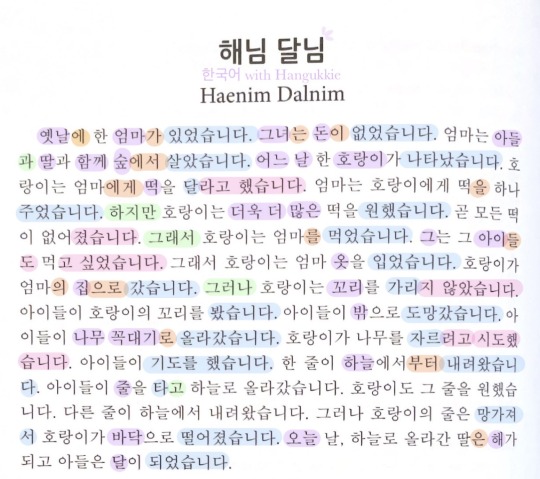
English Translation:
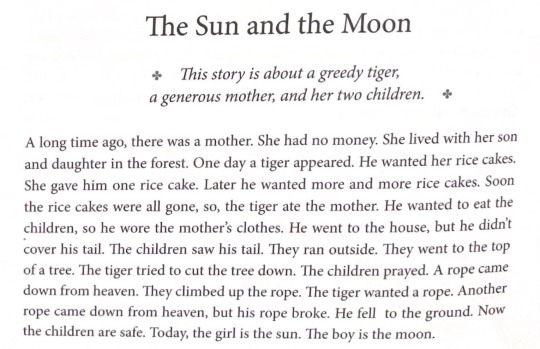
———————————————————
Vocabulary:
옛날 - Olden days
옛날에 - Once upon a time
어머니/엄마 - Mum
그녀 - She/Her
돈 - Money
아들 - Son
딸 - Daughter
함께 - Together
숲 - Forest
어느 - Which
날 - Day
호랑이 - Tiger
떡 - Rice cake
더욱 더 - More and more
많이/많은 - Many/A lot
그 - He/Him
아이 - Kid/Child
아이들 - Kids/Children
옷 - Clothes
집 - House
꼬리 - Tail
밖 - Outside
나무 - Tree
꼭대기 - The top
하늘 - Sky
줄 - Rope
바닥 - Floor
오늘 - Today
해 - Sun
달 - Moon
Grammar - Verbs:
있다 - To exist
없다 - To not exist
살다 - To live
나타나다 - To appear
달다 - To ask/To request (In this context)
주다 - To give
원하다 - To want/To wish/To desire
먹다 - To eat
가다 - To go
가리다 - To cover
보다 - To see
도망가다 - To run away
올라가다 - To go up
자르다 - To cut
기도를 하다 - To pray
내리다 - To get off
떨어지다 - To fall
된다 - To become
Grammar - Sentence Forms:
라고 하다 - For indirect quotations
지다 - To become
도 - Too/Also/As well as
고 싶다 - To want
지 않다 - Is not
려고 - To intend to
시도하다 - To attempt to
Grammar - Connectives:
과 - And/With (With 받침)
하지만 - But
그래서 - So
그러나 - But/However
하고 (고) - And/With
Grammar - Markers/Particles:
에 - To/At (Location and time marker)
가 - Subject particle
는 - Topic particle
이 - Subject particle (With 받침)
에서 - At/In/On/From (Location marker)
에게 - To/For
을 - Object particle (With 받침)
를 - Object particle
들 - Plural marker
의 - Possessive marker
으로 - By/As/For/To/Towards/With (Directional marker)
로 - By/As/For/To/With (Directional marker - with 받침)
부터 - From/Since (Location and time marker)
은 - Topic particle (With 받침)
#korean language#korean langblr#korean#langblr#korean study blog#korean studyblr#study blog#studyblr#korea#korean vocab#korean vocabulary#korean vocab list#Korean stories#Korean fairytales#Korean folktales#korean folklore#한국#한국어#한국어 공부#한국어 읽기#한국어 어휘#한국어 단어#한국어 문법#공부#읽기#어휘#단어#문법#한국 전래동화#전래동화
364 notes
·
View notes
Text

🌸🌼🌸 30-Day Journey to Korean Language Mastery! 🌸🌼🌸
Hey there language lovers! Are you ready for an exciting adventure in learning Korean at a more intermediate level? 🇰🇷✨ In this 30-day study schedule, we'll dive into some juicy grammar topics that'll take your Korean skills to the next level. Ready to embark on this language adventure? Let's rock this 30-day challenge together! Happy studying and remember, every step counts on the road to Korean language mastery! 화이팅! 💪✨
Week 1: Verb Modification and Advanced Sentence Structures
Day 1: Time to dust off those honorifics and level up your respect game! Show some love to those verbs with various honorific verb endings.
Day 2-3: Let's express our wishes and assumptions with "았/었으면 좋겠다" (I wish I had) and "-(으)ㄹ 텐데" (I suppose, I think). Wishful thinking, here we come! 🌠
Day 4-5: No more doubts about "have to" or "can do"! Master "-아/어/여야 하다" (have to, must) and "-아/어/여도 되다" (can, may).
Day 6-7: Weave your magic into sentences with various verb modifications and advanced structures using the things you've studied the past few days.
Week 2: Subjunctive and Concessive Expressions
Day 8-9: Curiosity piqued? Delve into "-아/어/여 보다" (try to do) and "-아/어/여지다" (become something). Adventure awaits! 🚀
Day 10-11: Unveil the power of "even if" with "-더라도" and the allure of "either" with "-든지".
Day 12-13: Embrace "no matter how much someone says" with "아무리~-(으)라고 해도" and the certainty of "regardless of" with "-든간에".
Day 14: Take a deep breath and look back on the amazing grammar points we've conquered so far! You're soaring to new heights! 🦅
Week 3: Advanced Particles and Connectives
Day 15-16: Adventure calls! Set out on "-을 테니까" (since I will) and navigate "-느라고" (because of, due to).
Day 17-18: Embrace the twists and turns of "-를 지경이다" (to the extent of) and "-는바람에" (because of, on account of). The path may be challenging, but you're up for it!
Day 19-20: "Even if it's tough, let's do it!" Dive into "-아/어/여서라도" and "might have to do" with "-아/어/여야 할지도 모르다".
Day 21: Let's take a moment to bask in the glory of the grammar points we've mastered in Week 1 to Week 3. Proud language learners unite! 🌟
Week 4: Expressing Intention and Assumptions
Day 22-23: Master the art of expressing intentions with "기로 하다" (decide to do) and "으려던 참이다" (was about to do). Your plans are set in motion!
Day 24-25: Delve into assumptions with "ㄴ/는다고 하다" (heard that) and "ㄹ/을 것 같다" (seems like). The mystery unfolds! 🔍
Day 26-27: Let's get speculative with "것 같으면서" (while feeling like) and "(으)니까" (since, because). The intrigue continues! 🕵️♂️
Day 28: Embrace your linguistic prowess as you navigate the subtleties of intention and assumptions. Let's recap the past few days!
Week 5: Advanced Particles and Expressions
Day 29-30: Explore the nuances of "만에 하다" (to do after a long time) and "아니면서도" (although, even though). Time to fine-tune your expressions!
Day 31: Reflect on your incredible progress and pat yourself on the back for conquering advanced grammar structures. You've come so far, and there's no stopping you now! 🎉
#Learn#Learning#Language Learning#korean#studyblr#koreanblr#langblr#study#vocabulary#vocab#words#studying#Vocabulary#Vocab#Words#Practice#study challenge#30 day challenge#language
227 notes
·
View notes
Text
If you are HSV positive (including having only "cold sores"), I highly recommend taking a daily antiviral. There is increasing evidence that HSV increases the risk of dementia or cognitive decline. However, antivirals seem to be protective against this outcome.
As an added bonus, you shed fewer viral particles and thus greatly lower the chance of infecting others—which can occur via casual contact like sharing food. Even when you are asymptomatic!
I've often found it surprising how few people are on an antiviral regimen given how common it is to be HSV positive (approximately 1 in 6 people age 14 to 49 in the US).
This 2021 review covers the evidence surrounding HSV's association with increased risk of dementia as well as "the apparent protective effects of treatment of HSV1 infection or of VZV infection with antivirals prior to the onset of dementia".
More recent study (2022) in the Korean population that shows increased incidence of dementia in individuals with HSV1.
Notable Nature paper (2021) which failed to find association with dementia. However, the authors still found an increase of "cognitive decline".
When the 2021 review says "overwhelming evidence", they mean it. There are many studies which have shown this association which I will not repost so check out their references if you are interested.
89 notes
·
View notes
Text
After School ☆ L. Heeseung x Reader
Masterlist | Pt.1

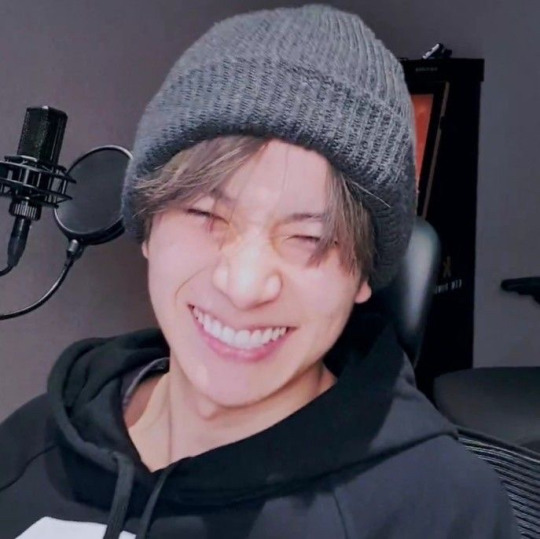
☆ Synopsys : You have always been very interesting to Lee Heeseung. You keep to yourself, stay away from others. When you're assigned as his tutor, he does as he always does with the peculiar, he decides to figure out what's 'wrong' with you. But you're very different from how you seem.
☆ Tw: Swearing

“Fifty marks,” Mr. Yu grunted. “Twenty-two. Fifteen. Thirty-seven. What do these have in common?”
Heeseung shrugged, loosening his tie nonchalantly. His smirk only grew when he realized his actions had Mr. Yu even more frustrated. “They’re failing grades.”
“And?” It was obvious the poor man was about to burst. “Do you not care that you’re failing Korean, English, Physics, and History? Do you not care about University? No one will want you with these grades.”
This didn’t even phase Heeseung. “Frankly, no. I don’t care.”
Mr. Yu took a deep breath, setting his glasses on the table in front of him. “Lee Heeseung. You excel in math. You’re practically a prodigy. Why can’t you funnel that energy into other subjects?”
Another shrug from Heeseung. “Dunno.” The clock ticked on the wall as silence stretched between the two. Mr. Yu stared the boy down, slowly studying him. “What?”
“I’m going to have one of your classmates tutor you.” Heeseung’s eyes widened. He watched Mr. Yu pull out a manilla folder, leafing through it until he made an ‘aha’ sound.
“I don’t need tutoring Mr. Yu,” Heeseung huffed. “I’m perfectly fine-”
“Y/n. She’s perfect.” Mr. Yu grabbed a Post-it note and scribbled something down. “I’ll contact her. Trust you’ll be eating lunch with me if you stand her up.”
“What is this, a date?” The boy scoffed, grabbing the note.
Library 7:30.
Fuck.
-
Heeseung recognized you the moment he set eyes on you. Your face was not easily forgettable. It was one he, admittedly, loved to think about.
You were strange to him for two reasons.
Why would someone so beautiful not use their blessing? He for one loved to use his superior looks to escape detention or an awkward conversation.
You never chose to interact with anyone. Not him, not their teacher (unless forced,) not his friends, and seemingly, you had no friends of your own.
You looked up at him, raising an eyebrow. "Are you going to sit, or keep staring?" He opened his mouth to reply, but shut it and sit down. You pretended not to find this amusing. "Can I see your tests?"
Heeseung quickly regained his composure, handing you the papers with a smirk. "So you speak."
You gave him a harsh look. "Of course I speak, I just don't find anyone in our class appealing enough to speak to." You looked at his papers slowly. "You suck at all of these by the way."
"Ouch," Heeseung said, maintaining a playful smile despite his genuine hurt, "And, what makes people so unappealing?"
You study him for a moment. "People make people unappealing."
"Fair...fair enough."
You handed back his papers, scooting your chair closer to his. "You need most help in English right?" He nodded, slightly intimidated by your closeness. "Can you fill out this sheet for me?"
Heeseung glanced at it and scoffed. "No."
"No?"
"I don't know what any of this says."
You held in a sigh, quickly collecting yourself. "This is the first thing we learned this year."
"Yeah," Heeseung smirked. "I didn't pay attention.
"Not-" You clenched your fists. "Okay. Let's start with the basics."
It took him until exactly 10:23 to finally grasp the placement of particles. By then, you were over it.
"Okay," You let out a breath. "Let's be done for today." You wanted to be done forever but knew Mr. Yu would never allow that.
Heeseung looked perplexed still, but shook his head. "Can I have your number?"
"What for?" You looked at him suspiciously. His newly formed smirk did not help your disease.
"Just for later tutoring sessions."
"Fine."
As expected, Heeseung did not text just for tutoring sessions. When you asked him to shut up, however, he always had some smart comeback like "How could I stop talking to such a pretty girl" or "But you're just so irresistible."
Admittedly, you began to find this enduring. Maybe even pleasant.
He started to actually listen during lessons, and they were less stressful, becoming the highlight of your day. His desperate attempts at flirting made for a good laugh. Sometimes, you'd even let him penetrate your little bubble in the cafateria.
Today, you were at Heeseung's house sitting on the floor. It was one of the more unproductive days. He sat there trying to spin a pencil on his finger.
It was a futile effort.
"Come on Hee," You said. "We're almost done, just finish it."
He looked at you, and then the worksheet. "But it's boring."
This, you couldn't argue with. "What do you want in exchange for you finishing your work?" You pinched your nose bridge, exsahsted.
Heeseung thought for a moment before a large smile painted his handsome features (it wasn't that you found him handsome, he just was objectively so.) "I want a kiss."
His remark surprised you. "Haha, funny," You sneered. "I'm not kissing your ass."
"Although my ass is pretty nice, I meant on the lips."
"Weirdo."
He shrugged, raising his eyebrow. "I'll finish the paper if I get my reward."
"Just..." You huffed, throwing the papers at him. "Finish the damn worksheet."
For an hour he worked undistracted. You watched him. In the past week he'd improved in all subjects, he seemed to work harder. When he was done, he handed you the paper.
Most of it was correct.
"Good job," You said, starting to clean up. "I'll see you tomorrow at the same time."
Confusion appeared on Heeseung's face. "Hey where's my reward," He huffed. "You said-"
"I didn't say anything." This wasn't untrue nor was it completely honest.
A frustrated sigh left Heeseung. "Fine." You packed up your things, trying not to feel completely horrible about his sulking.
But it got to you.
You were halfway through the door when you turned around to kiss him on the cheek. "Good job, Lee Heeseung." He smiled, but you turned on your heel to leave before he could say a word.
#enhypen#enhypen x reader#fluff#heeseung#heeseung x reader#y/n#kpop bg#kpop#kpop x reader#enha#enha x reader#enha fluff#enhypen heeseung#lee heeseung#lee heesung x reader#lee heeseung fluff#cute#kim sunoo#yang jungwon#nishimura riki#sim jaeyun#park jeongseong#jay enhypen#jake enhypen#park sunghoon#enhypen fanfiction#enhypen au#park jongseong
46 notes
·
View notes